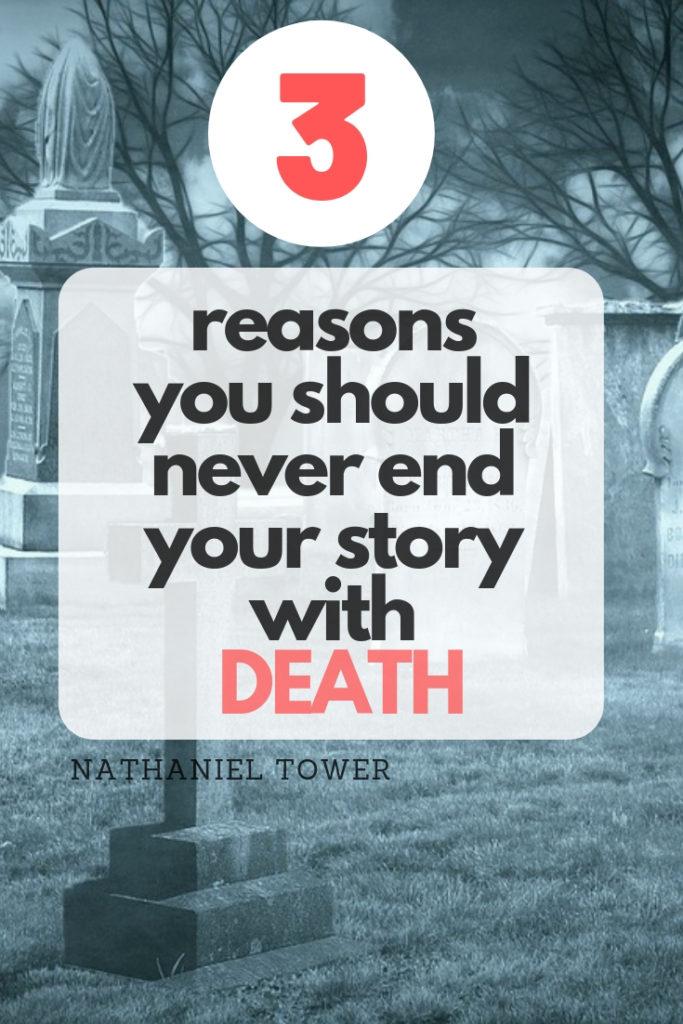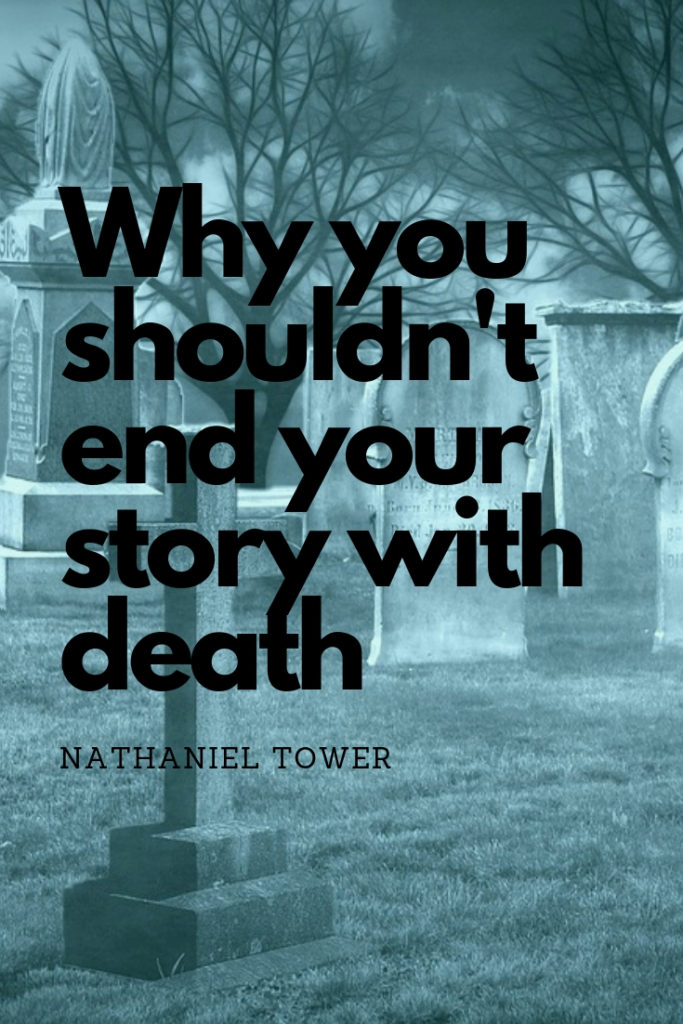Last Updated on February 1, 2020 by Nathaniel Tower
The leading cause of death in unpublished fiction is the end of the story.
Oftentimes, these deaths are inexplicably violent, coming out of nowhere like the speeding drunk truck driver who just ran a red light and T-boned a defenseless sedan, sending the driver flying through the windshield and onto the pavement where he is then run over by a steamroller. Or maybe like an unexplained brutal murder with no justifiable motive committed with a mallet, sawed-off shotgun, or wood chipper. Or maybe things are a little more serene, like drinking poison, getting mauled by an army of raccoons, or slipping into a coma and never returning.
Whatever the case, characters are dying off at the end of stories in unprecedented numbers. And it’s just plain tragic.
Why writers end with death
I suspect there are three causes of this epidemic:
- Too many writers drawing inspiration from Tarantino films.
- Lazy writers who can’t figure out any other way to end a story.
- Uninspired writers who believe that every story must end with death because art should reflect life and death is the ultimate end of every life.
Regardless of the reason for the plenitude of death-endings, we need to put a stop to them. We need to save these characters from this untimely and unfortunate end. Even more importantly, we need to save the readers from these endings.
Of course, there aren’t any readers for many of these stories. Luckily, most of these death-endings stay unpublished. There are many otherwise perfectly acceptable stories that can’t weasel their way into publication because the author chose to resolve everything with death rather than opting for an actual ending.
Before we continue the crusade to save these characters from these undeserved and often tragic deaths, let’s take a moment to discuss why ending a story with death is such a lousy thing to do.
The 3 main types of writing death
Death endings typically fall into one of these categories:
- The sentimental death, where a character (and by extension, the reader) is profoundly affected by the death of a loved one or close friend. Sometimes these deaths are expected, the culmination of months or years of suffering. However, even more often, these deaths are tragic endings (bloody car wrecks are probably at the top of the list) that leave the other characters reeling for some sense of closure. These stories often send the message that life is precious or that you never know what’s going to happen so you should live every damn moment to the fullest.
- The out-of-nowhere death, where a character dies in some crazy and unexpected scene. For the most part, nothing is gained because of this death. None of the other characters really change, but the story can’t go on out of the sheer horror of the event. These stories remind us of how fragile we all are and that we can die at any moment. But they don’t stress the need to cherish those we love. Rather, they leave us in shock, our mouths twisted in Os and our eyes bulging from the sockets.
- The convenient death, in which a character’s ultimate demise provides some sort of out for the other characters. The reader may be slightly stunned by the suddenness of the death, but if it allows the main character to win, then it can’t be all bad, right? Instead of being shocked, the reader raises his or her hands in triumphant joy. We have won because we have killed!
There is a bonus death in which the main character is the one who dies. This is especially egregious when the main character is also the narrator who is describing his or her death scene. Occasionally, these stories may even end with the old “and everything went black” trick. No matter what the final image brings, the reader is left with the sole notion that this entire thing was a waste of time and that the narrator would have probably been better off not existing to begin with.
Why you should (almost) never end with death
So why is it so bad to end with death? Why does it make readers groan and editors instantly send a rejection?
There are three reasons why ending your story with death sucks:
- It’s cheap.
- It’s too easy.
- It’s infuriating.
Okay, these are probably all pretty much the same thing. It’s cheap because it doesn’t give the characters a fair shot. It’s too easy because it doesn’t require any actual thought regarding how to bring things to a close. It’s infuriating because the reader has invested something in the story and the characters only to see it all end with death.
But, the death-issuing writers protest, life ends with death! How can a story end any other way?
Well, if that’s your argument, then I suppose you better start every damn story with birth. If we don’t see a screaming blotchy newborn spill out of its mother covered in goop, then you are robbing us of the experience of life in fiction. I demand all literature contain the complete life cycle for every character!
Killing your characters just so you can end your story shows that you aren’t really in control of anything. If the only way you can reach a conclusion is through an unexpected death, then it probably isn’t really a story worth telling. A violent and twisted death at the end of a story isn’t a plot device. It’s the failure of a writer to tell an actual story.
It’s okay to kill your characters
This isn’t to say that characters can’t die at the end of your story. Look at all the great pieces of classic literature that do contain a death at the end. Of course, how many of them end with some overly contrived death that leads to a neat and tidy closing that couldn’t have otherwise been achieved without a death?
Are you planning to kill of your characters just to wrap up your next story or book? Please rethink it. For the sake of all those characters whose lives ended too soon, please find another way.
Do you ever end your stories with death? Share your near-death writing experiences below in the comments. And don’t forget to share this post on all your favorite channels.



Your opening line really cracked me up.
This was a good article for me to read right now. I’m giving some thought as to the fate of a villain in my novel and how to avoid handling it badly.
Thanks for reading and commenting. I hope you find the right way to end your novel. Obviously there’s no universal solution here. I’ve just seen way too much cheap and easy death. Please don’t go that route. If you must kill your characters, do it the right way!
Nate
WWN ends in “death” because you are right and the book is about what is right in writing and movies and America. Of course the good die young and all that, even in fiction. Unless it is a fiction.
Wow! That is epic advice! I try to put myself in the mind of the reader. Death IS trulya disappointing ending in fiction! Thank you, Nathaniel! I am thrilled to have stumbled upon your site!
Fantastic tip, Nathaniel!
Thank you!
I was JUST talking with someone about how we’ve been disappointed by stories that end with a death when it seems the author simply used it as a cheap way to twist people’s emotions or because they didn’t know how to tie up loose ends. And then I stumbled on your post! Thanks for validating what we’ve been thinking about 🙂